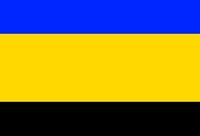Sopian language
| Sopese | |
|---|---|
| Tiñaliól/Sopés | |
 | |
| Pronunciation | [tˌiɲaliˈol] |
| Region | Sopia |
| Ethnicity | Sopian |
Native speakers | 8, Second Speakers: 30 aprox. |
Occitano Romance | |
| Dialects | Central, Southern |
| Latin Alphabet (Sopian Script) | |
| Official status | |
Official language in | Kingdom of Sopia |
| Regulated by | Royal Linguistic Society of Sopia |
| Language codes | |
| ISO 639-3 | – |
The Sopian or Sopese language, also known as Tinyanan (autonym: Sopés or Tiñaniól) is an Occitano-Romance language spoken in the Kingdom of Sopia and it's the main language of this country and one of the nationwide official languages along with Spanish.
Sopian descends from the medieval Occitan spoken by pilgrims that settled in the area, this early Occitan mixed with the local Asturian language and was influenced by medieval French, Spanish and Galician, creating the Sopian language.
Example phrases
| English | Sopian |
|---|---|
| Hello (informal) | Hola |
| Hello (formal) | Salut |
| Have a good day | Pas un bon jor |
| How are you? | ¿Com stas? |
| What's your name? | ¿Com ti nomas? |
| Who are you? | ¿Quíe ses? |
| My name is ___ | Mi nomo ___ |
| I'm here | Sto acü |
| Nice to meet you | Polén conacirti |
| How old are you? | ¿Quants anns tenes? |
| I'm ___ years old | Teno ___ anns |
| Will you be there? | ¿Staréis alhá? |
| Please | Perfavor |
| Thank you | Gracit (male) / Graciya (female) |
| I'm sorry (informal) | Pardón |
| I'm sorry (formal) | Repén |
| Excuse me | Pardoni |
| Do you speak English? | ¿Parlas anglés? |
| Do you speak Sopian? | ¿Parlas sopés? |
| Help! | ¡Ajuda! |
| Good morning | Bon jor |
| Good afternoon/evening | Bona tarda |
| Good night | Bona nait |
| I don't understand | Non compro |
| I understand | Compro |
| Leave me alone | Jédimi an paç |
| Don't touch me | Non mi toches |
| How do you say ___ in Sopian? | ¿Com dices ___ an sopés? |
| Where is the toilet? | ¿Ond sta lo baño? |
| Can you help me? | ¿Podes ajudarmi? |
| Can I rent this room? | ¿Pou logar aquesta cambra? |
| How's your day going? | ¿Com va lo teu jor? |
| Spring is my favorite season | Galva sé la mea estaçón prajagada |
| Let's go to the beach in Summer | Vaians a la plaja an estiu |
| My favorite color is red | Lo meu color prajagat sé lo vermelho |
| Who's that man/woman? | ¿Quíe sé aquest/a home/mülher? |
Example text
Poem in Sopian:
Nol broget de la batalha,
un jove nas seas trintxeras
reve de paç, reve de lars sen flamas,
proe la guerjxa ainplacable non boca.
Cayeron los murs de sea terra astimaya,
lo rü dos artilhers, xorecesór,
ei ante lo fum ei la chegra dai una viça pardiya,
una súplica nol seu cor: lo fin dol horrór.
Seis ojos fatigueyos, reflex d'un aima an duel,
seu corp tajxat agafat a un fusíl,
sabora la fatídica soleyá dol seu anhél,
meintre l'esprança agoniza nol seu estat frágil.
Sé una sola jageça,
dexar sea patria,
u vivir dafeit sea viça.
Translation in English:
In the glare of battle,
a young man in his trenches,
He dreams of peace, he dreams of homes without flames,
but the relentless war does not cease.
The walls of his beloved land fell,
the noise of the artillerymen, deafening,
and between the smoke and the sorrow for a lost life,
a plea in his heart: the end of the horror.
His weary eyes, reflection of a soul in mourning,
his tired borid, holding on to a rifle,
savor the fateful loneliness of his longing,
while hope agonizes in his fragile state.
It's just one choice
leave his homeland,
or live his entire life.